Ethel Turner's Seven Little Australians added to UNESCO Memory of the World register - The Missing Pages restored
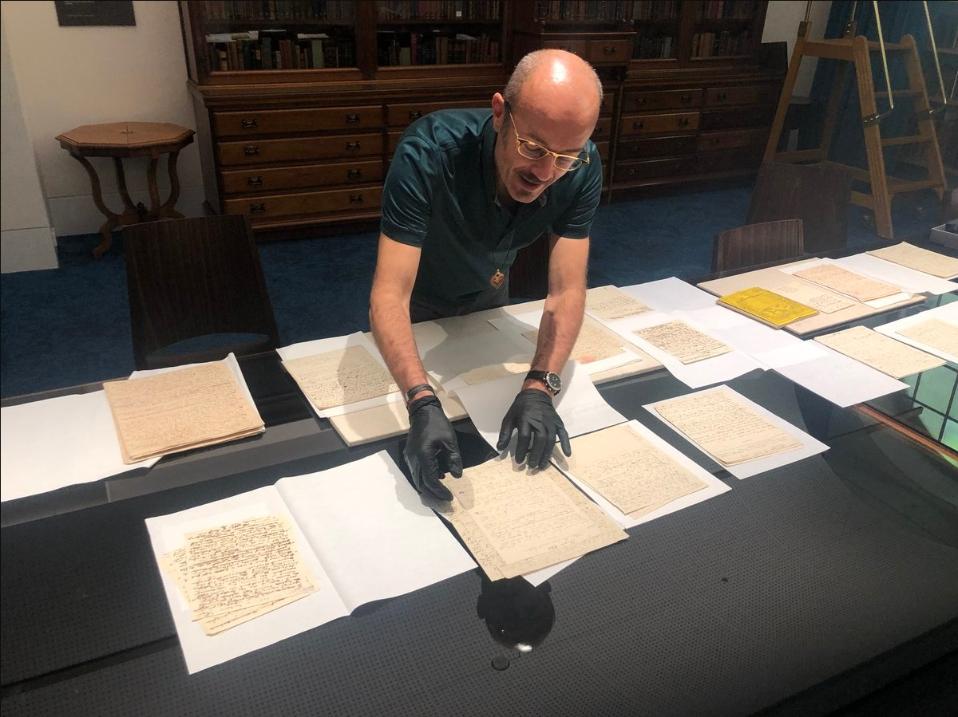
Matthew Curlewis at the State Library of NSW on Monday, July 1st, examining his great grandmother's Seven Little Australians - State Library of New South Wales Photo
The original manuscript for Ethel Turner’s Seven Little Australians, held in the State Library of NSW’s collection, was added to the UNESCO Australian Memory of the World Register in February 2019.
Ethel Turner’s manuscript becomes the 57th item in the register, placing it alongside the 'Endeavour' journal of James Cook, the collective journals of the First Fleet, and ‘Core of my Heart’, the original manuscript of Dorothea Mackellar’s über famous poem, ‘My Country’. This in turn makes Ethel Turner (married name Curlewis), the second of only two women of literature to be included in the Australian Chapter of UNESCO’s Memory of the World Program.
‘Sketched out’ in 1893, Ethel’s 182-page manuscript would become one of Australia’s best known children’s stories and arguably her greatest achievement. The manuscript, written on scraps of paper, is a record of her creative process. The first few pages alone document the progression from working title ‘Six Pickles’ through to ´Seven Little Australians’.
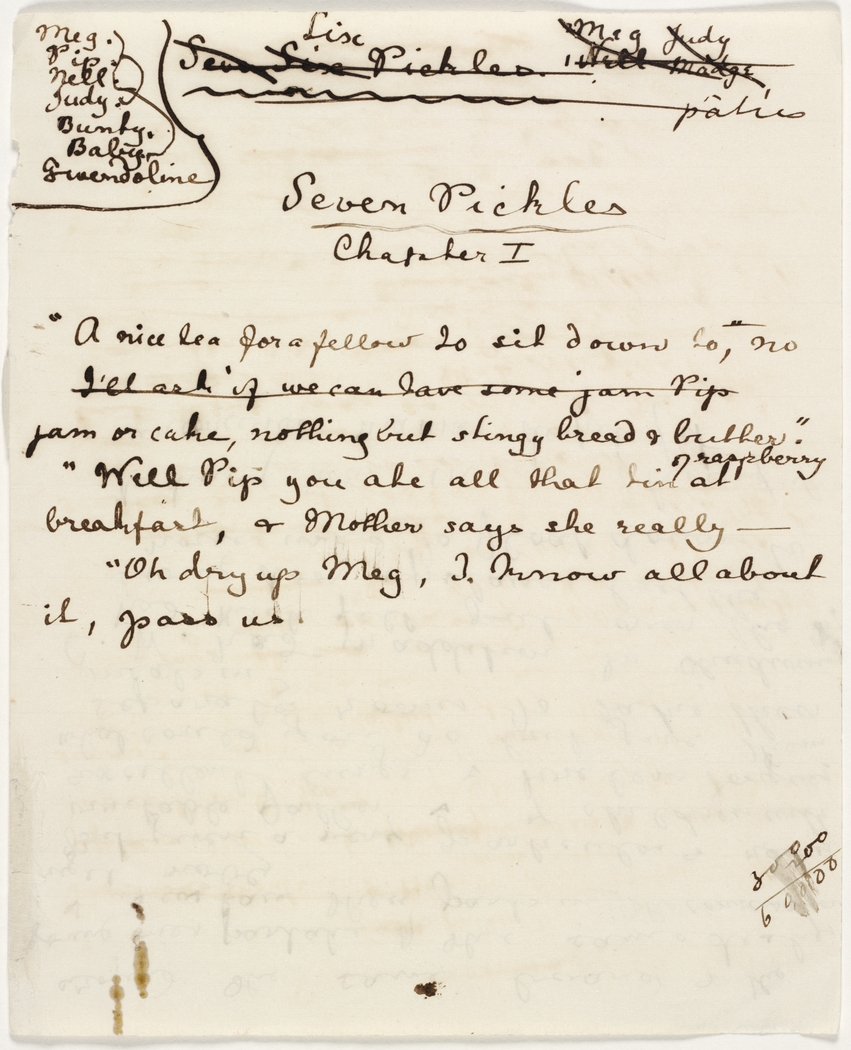
Seven Little Australians draft - Image No.: a2104001r, courtesy State Library of NSW
It is rare for a 19th century literary manuscript to survive, especially one with the significance of Seven Little Australians. The inscription of the manuscript on the UNESCO register acknowledges the important place that Ethel Turner and Seven Little Australians holds in Australian literary history.
Seven Little Australians marked a turning point in Australian children’s literature. Ethel wrote about everyday family life in urban Sydney and her characters were not only believable children – significantly, they were recognisably Australian. Seven Little Australians features a girl as its hero and, consequently, contributed to the foundation of girls' literature in Australia.
Ethel Sibyl Turner (1870-1958) was born on January 24th, 1870 at Balby, Yorkshire, England, second child of George Watnell Burwell, a well read, excellent linguist and merchant by trade descended from a well-known Scottish family, and his wife Sarah Jane, née Shaw (d.1923). Burwell died in Paris when Ethel was a mere two years of age. On August 21st 1872 in the register office, Yarmouth, Sarah Jane Shaw married Henry Turner, a widower 20 years older than her with six sons. They had a daughter, Jeannie Rose (b.1873). Ethel and her elder sister Lillian Wattnell Burwell (1867-1956) took their stepfather's name and were known throughout their professional careers by 'Turner'. Mr. Turner, a factory manager, fell into financial difficulties after a long illness and left only £200 when he died at Coventry in August 1878.
Nine-year-old Turner emigrated to Australia from England in 1879 with her mother and sisters just after Christmas per the Durham. Their mother, Sarah Jane worked as a supervisor in a large department store and they were living in Stanley Street, in the heart of the city. On December 31st, 1880 her mother married Charles Cope, a clerk in the Department of Lands and brother of William Cope
Both Ethel and Lilian had a flair for writing and while attending Sydney Girls High School they produced their own magazine, the Iris. Some biographers state they ran this in opposition to the Gazette, edited by Marie Louise Mack, sister of Amy Eleanor Mack, who had rejected their submissions.
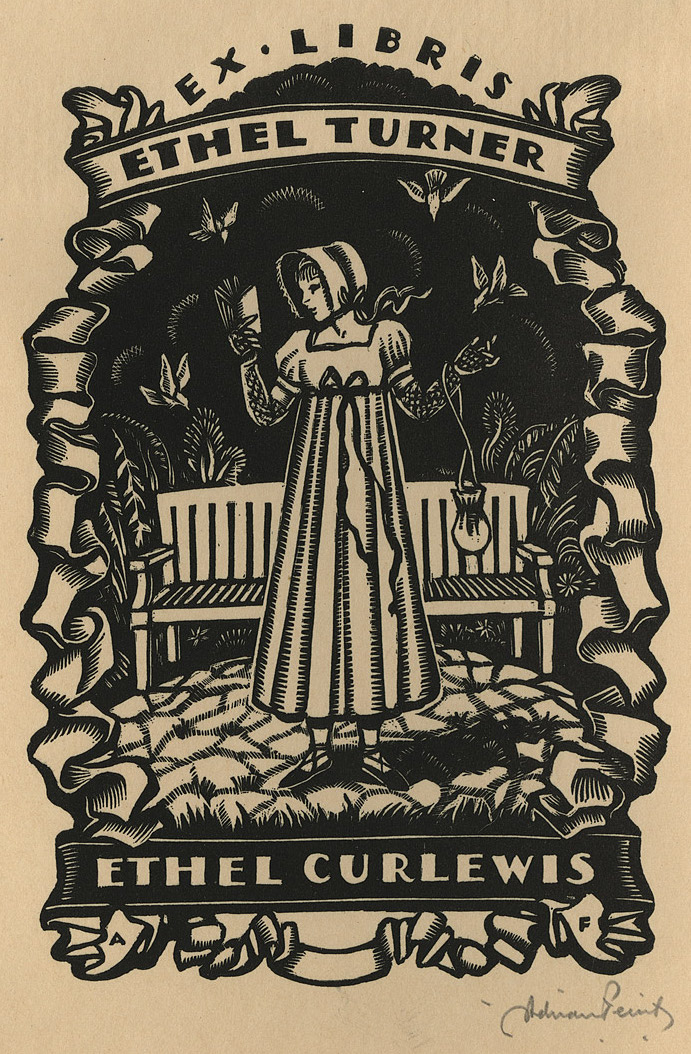
Ethel’s personal Adrian Feint-illustrated bookplate - courtesy Curlewis family records.
After leaving school the Turner girls founded the Parthenon, a monthly magazine of which the sisters were the primary contributors. Ethel wrote children's columns for the Illustrated Sydney News and later for the Australian Town and Country Journal as 'Dame Durden' until that paper closed in 1919.
Seven Little Australians was a spectacular success when it was published in 1894 and has been in print continuously ever since, longer than any other Australian children’s book. It was one of the earliest Australian children’s books to be translated into a foreign language (Swedish in 1895) and to date has been translated into over ten different languages.
Ethel wrote Seven Little Australians at Inglewood in Lindfield (now Woodlands, Killara) in 1893. Her suburban bushland surrounds became a key feature of her stories. On her 23rd birthday, Ethel wrote in her diary,
'Seven L. Aust. – sketched it out.' (24 January 1893).
'We have decided to go to Lindfield. It will be like being buried alive to live in a quiet little country place after the bustle and excitement of town life’, wrote Ethel Turner, who was not keen on her family’s move to the North Shore from the city suburb of Paddington in 1891. Although Ethel initially objected to the move, she soon 'liked the place awfully. It is a pretty square house with a long balcony and verandah, honeysuckle and white roses creeping up' (29 Sept 1891[AW1] ).
Turner was prolific during her time in Lindfield, writing three novels as well as newspaper articles and short stories between 1891 and 1894.
Her first novel, Seven Little Australians, originally titled 'Six Pickles’, has been staged for the theatre (1914) and filmed (1939). Its frequent reprinting and an Australian Broadcasting Commission (ABC) television version in 1973 have confirmed its status as one of Australia's few undeniable children's classics.
It was followed by a sequel, The Family at Misrule, in 1895.
Ethel Turner married a lawyer, H.R. Curlewis in 1896 and by the time of her death in 1958 had produced over 40 books as well as numerous short stories and poems.
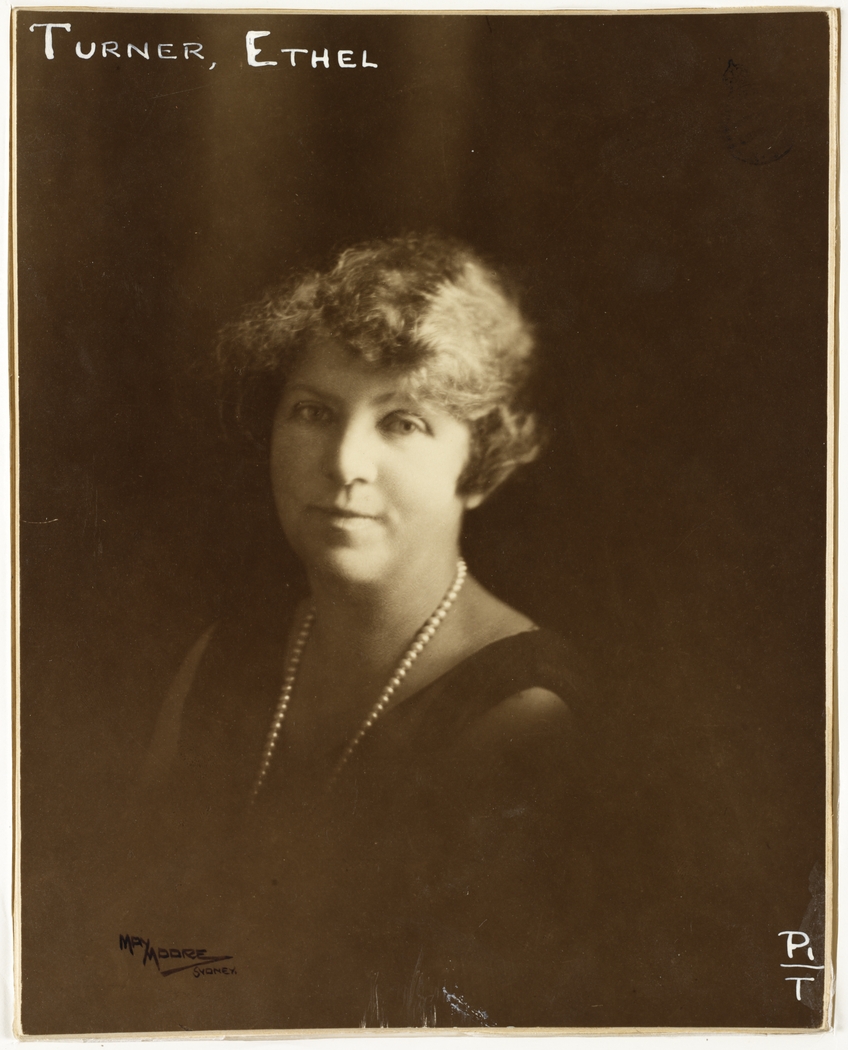
Ethel Turner, 1927 / photographic portrait by May Moore, Sydney, 1927, Image No.: a1528308h, courtesy State Library of NSW
Many in Pittwater will know Ethel Turner was a frequent Palm Beach visitor and the mother of (Sir) Adrian Curlewis, a founding member of Palm Beach SLSC, the 'father of Australian Surf Life Saving', and Jean Curlewis, also a prolific writer, with Palm Beach, Newport and Pittwater among her stories.
Adrian was the father of Ian and Philippa Curlewis (Poole) - Ian is the father of Matthew Curlewis.
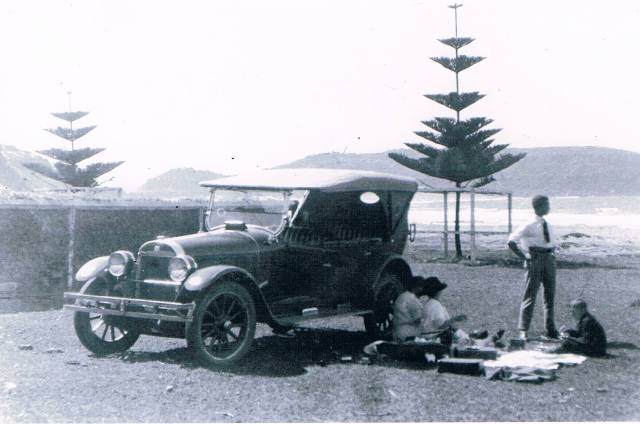
This early T Model Ford was one of the four cars to be seen at Palm Beach in the early 1900’s. In this photo Ethel and her sister Lilian and son were having a picnic whilst Adrian, looking out to sea, seems to be contemplating what lay ahead for him. - Photo courtesy Philippa Poole
PALM BEACH.
THE ROCK POOL.
God in a delicate mood parted these headlands,
Bade His unwearying waters fret Him a bay.
All the bright breakers sang at the chance to adore Him,
All the blue breakers rolled from His feet to obey.
Cream as the clouds curves the sand where the light foam races,
Green, all a-patterned with grey is the gown of the land,
The land stepping down, austere, from the hill-top places
The sky in her hair and her silver feet in the sand.
There is a pool by the cliffs that the waves wash over,
A clean-cut pool where a child may dive and play.
Low on the rocks it lies, like a sky-dropped mirror,
Never a light but it catches the live-long day.
For I have waked with the sun not over the headland,
All of the sea sun-grey, with one thrust of jade,
And in the heart of the pool, like a jewel lying,
One point of light from the cold green thrusting made.
Nearer the top of the hill, the slow sun struggles,
Primrose drifts on the sea with one purple stain,
And now in the pool's pale silver, is lying, lovely.
Violet, amethyst, amethyst, violet again.
Wild rose in the pool, white clouds and the sunset's rainbow,
A moon in the pool, a shy moon, bathing alone,
And, as I sleep, the stars sown in millions around me,
One shoots down and drowns in it like a stone.
God, in a delicate mood, parted these headlands,
God let the breakers fret Him this delicate bay,
Man made the pool, the clean-cut pool in the boulders,
God, in a delicate mood, glances its way.
ETHEL TURNER.
PALM BEACH. (1926, February 6). The Sydney Morning Herald (NSW : 1842 - 1954), p. 11. Retrieved from http://nla.gov.au/nla.news-article16265379
What follows below is written by Matthew Curlewis. Matthew originally wrote this shortly before Australia Day 2016 and has given us permission to republish it. It was recently published in the 2019 edition Blume Illustrated, a fantastic annual arts and illustration focused magazine dedicated to bringing ideas to light through the print medium.
A Launch of this year's Blume Illustrated was held in the Blue Mountains, at Katoomba's Carrington Hotel, in the Baroque Room, on Thursday May 30th, 2019.
Matthew read his article about an aboriginal-themed story that is ‘missing’ from ‘Seven Little Australians’ editions published between 1896 and 1994. He also read from some Blue Mountains-themed work written by Ethel’s writer daughter, Jean Curlewis.
Two generations represented.
Then with his father, himself and one of his sisters Luisa, plus one of his nieces Lily, they achieved five generations of family, in the room, who have all had specific and valuable relationships with the Blue Mountains over the years.
With his lovely husband Mart by his side, crying tears of happiness along with his parents, plus the huge grins of support from friends who had travelled especially to this event including Ruth, Helen, Kate and her sister Anna, and Denise and Garry Wilson, it was a pretty extraordinary and emotional evening.
Artist Faye Wilson showing my article in Blume, including her amazing illustration of Ethel Turner, in which Faye has inlaid an illustration from the cover of Seven Little Australians' first edition, into the pattern of Ethel's dress. Matthew's parents to the left, along with niece Lily and sister Luisa.
Family!
Photos included here are the manuscript, Ethel’s personal Adrian Feint-illustrated bookplate, family on the night, and a 1920's Blue Mountains photo of Matthew's grandfather Adrian Curlewis, Ethel Turner, Jean Curlewis and her husband Dr. Leo Charlton.
About MC!
Amsterdam resident Matthew Curlewis is an Australian screenwriter, copywriter and writing consultant, and the great grand-son of Ethel Turner. His short film Brilliance was one of Eye International’s ‘Selected Dutch Shorts 2015’, a film programme appearing at Clermont-Ferrand, Berlin, Cannes and other international film festivals during 2016.
Originally trained as a performance artist, Matthew still makes appearances as an event host or emcee - either as himself, or as one of his performance characters.
In the Netherlands Matthew has read and performed his own original works at venues as diverse as wordsinhere's Open Stanza at The Sugar Factory, Utrecht's Salon des Mots, Club Winston, Bevrijdingsdag at the Homomonument, the Rialto Cinema and the Binger Filmlab.
In New York Matthew has performed at Stories from the Moth at Joe's Pub, at Marion's on the Bowery, and on numerous cabaret stages across the City. Matthew also acted regularly with the Provincetown Theater Company, and mounted a one-person show entitled "Divamukti. Inhale, exhale, pose. Yoga for the New Millennium" as his character Gayle Force, at Marion's NYC.
And being a Curlewis he is, of course, just lovely!
You can find him at www.curlewiscreative.com
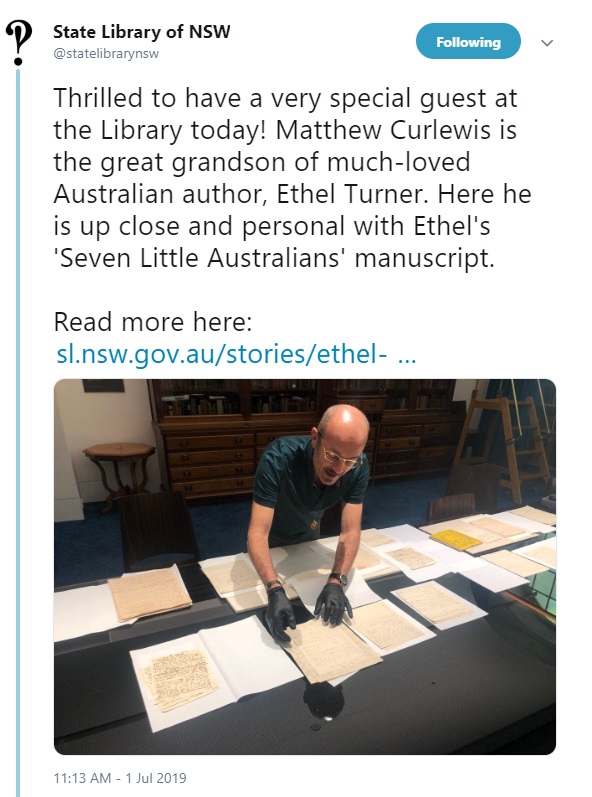
State Library of NSW on Twitter
Seven Little Australians – The Missing Pages
by Matthew Curlewis
An attempt on behalf of my ancestor Ethel Turner, to correct some Koori history censored out of her children’s book classic: Seven Little Australians.
A dreary, grey weekend in the south of the Netherlands. I’ve just been helping my Dutch parents-in-law move house, and am missing my own parents in Australia. Today, January 24th is my mother’s 84th birthday, and with the time zone constrictions I’ve only managed a short phone call to her. Tomorrow we’ll do better. Feeling slightly out of sorts and a long way away from anywhere, I gaze at the shelves full of Dutch titles I’ve just hauled out of boxes, until my eyes happen upon one of the few English-language books; a copy of Seven Little Australians. I take it down. It’s a centenary edition I gave my Dutch family some years back, printed in 1994. At that time my great grandmother, Ethel Turner, was the only Australian author to have ever had a book, (this book), in continuous reprint, for over one hundred years.
I flip through its familiar pages and settle instead on some publisher’s notes to this edition, at the back of the book. I’m surprised that I’ve forgotten this date was also Ethel Turner’s birthday – she was born on January 24, 1870. Ethel began writing Seven Little Australians when she was twenty-one. It was published in 1894 and to date has sold over two million copies, been translated into over eleven languages, and been made into a number of stage, film and television productions. All wonderful stuff yes, but nothing new to me here – this is information I’ve grown up with since birth, it’s always been around me. Until I hit the following:
“The first edition contained a four-page episode in which, in order to amuse the children while on the way to the picnic at Krangi-Bahtoo, Mr Gillet related an Aboriginal legend. For some reason this episode was omitted soon after the fifth edition (1896) and has not been reprinted since – until now. No doubt, discovery of this episode (pages 163-6) will come as a surprise to many older readers long familiar with Ethel Turner’s classic book – as will her use, in 1894, of the word “Koorie”.
– Walter McVitty, Publisher.
I was nothing short of astounded, and of course flipped straight back to those pages and read them. I’ve always felt a strange kind of through-time bond with my great grandmother – but to discover these pages – I can’t believe the injustice that has been done to her, and to her millions of readers, who, through this editorial excision, have been robbed of an opportunity she provided, of growing up and reading about Australia’s native people through a prejudice-free lens. For a start, she refers to them (in 1894 no less!) by their correct and preferred tribal name of Koori, then ups the ante by having the white narrator of the tale speak of a time, “when Tettawonga’s ancestors were brave and strong and happy as careless children, when their worst nightmare had never shown them so evil a time as the white man would bring their race…” And last but not least she embeds all of this in a delightful tale of how the kookaburra came to be a ‘laughing’ bird.
I’ve always felt that Ethel was cool, and somehow ahead of her time. But now to find that she was actually censored, that this passage of her story was at odds with British Empire building in the colonies? I’m somewhat stupefied, and feel that personally, I want to apologise to any friends who have read the book, or who’ve read it to their children, that you weren’t given the entire version. How insane history can be, and how destructive. Children’s books help us to shape our perceptions of the world around us. It is my belief that my great grandmother was attempting to show us a world that contains a greater amount of compassion and understanding. In these few pages, Pip, the eldest boy of the seven, refers with admiration to how he has seen Tettawonga, a Koori he is clearly familiar and friendly with, swing a snake around his head to kill it by breaking its back. How many young, white, male readers might have similarly, sought ways to admire Kooris, instead of deriding ‘bloody Abos’?
Some years ago, in conversation with my aunt Philippa Poole, Ethel’s grand daughter, my Dutch husband, (perhaps a little jet-lagged at the time) said, “And thank you for the gift copy of ‘Five Little Australians’.” Without missing a beat, and with a twinkle in her eye, my aunt apologised, “Oh dear, I must have given you the short version by mistake!”
Not that I could do anything about it since I didn’t know about the omission, but nevertheless, as a Turner descendant, I would like to apologise for the whiter, shorter version that has been in publication, between 1896 and 1994, of Seven Little Australians. I have included the missing pages, below.
And here also, is a link to the book: http://www.goodreads.com/book/show/662793.Seven_Little_Australians
The Missing Pages – written by Ethel Turner:
“How would you like some poetry, Miss Meg?” said Mr Gillet.
His hand went to his pocket, the large and lumpy Tennyson was drawn out: but a groan burst from Judy and Pip and Bunty and Nell and Baby.
“I’d rather get out and drag the bullocks and all,” said Pip; so the book was replaced.
“A tale with something in it now,” Judy said – “a laughing jackass, if you can’t think of anything better.”
One – solemn-faced, mysterious looking – had settled on a fence by the roadside, and thus suggested itself.
“Well, you might hear a worse story than about the jackass, or kookaburra, or goburra, or settler’s clock – whichever it may please you to call it,” Mr Gillet said, and stroked his moustache thoughtfully. “Tettawonga is really the best person to tell these Aboriginal legends; mine is only got at second-hand from him, and freely translated.”
Judy settled herself to listen, and jogged the General to keep him quiet.
“Wait till I heave this loquat at him,” said Pip, extracting one from his pocket, and dislodging the bird from the fence. “He might hear the lies about himself and feel hurt.”
“Once upon a time,” said Mr Gillet (Judy sniffed at the old-fashioned beginning), “when this young land was still younger, and incomparably more beautiful, when Tettawonga’s ancestors were brave and strong and happy as careless children, when their worst nightmare had never shown them so evil a time as the white man would bring their race, when – “
“Oh, get on!” muttered Pip impatiently.
“Well,” said Mr Gillet, “when, in short, an early Golden Age wrapped the land in its sunshine, a young kookaburra and its mate spread their wings and set off towards the purple mountains beyond the gum trees. They rested at night and for a time during each day to feed on worms, lizards, bush mice, and grubs, which were then the only food eaten by a kookaburra. One day, as they flew across a bilwy – which is a small stream, Miss Judy – they were much alarmed to see a great wipparoo – Tettawonga’s name for a snake, Pip – lying on a log. Its head was erect, its mouth wide open, and its neck very much inflated, and just above the monster’s head, fluttering and screaming wildly, hovered a beautiful little bird that the kookaburra at once recognised as the jeeda, the little blue wren. The wiparroo seemed to be doing all he could to terrify the little creature, now almost exhausted from fear and excitement. Nearer and nearer it flew, gazing madly into the glittering eyes of the serpent, and at last, with one piercing cry, fell helplessly into its gaping jaws. The kookaburra were very grieved to see so sad an end of the poor jeeda, and flew away swiftly from the sight of the dreaded wipparoo. Soon, however, they saw him gliding hurriedly through the grass, doubtless homeward-bent with his dainty supper. On the way there was a log burning slowly away, and the wipparoo, seeing it, lay down beside it, being very drowsy, and slept the sleep of the unjust.
“In his dreams he saw the jeeda again hovering above him, and, suddenly raising his head high in the air, he opened his terrible jaws – when lo! Out fluttered the beautiful little bird, and quickly flew away, safe and sound.”
“Good iron,” Bunty said, “Go on; it’s better’n ‘Jonah and the Whale’.”
“The kookaburras were so delighted at seeing the jeeda’s wonderful escape that they burst into a fit of loud laughter – the first time ever a bird was heard to laugh. Then the great red sun, that Tettawonga and all the Koories call Euroka, sank down behind the orange-flaming mountains, and the world grew grey.
“A tall young Koorie who was coming that way saw the wipparoo, and with one blow from his strong nulla-nulla, which, being interpreted, meaneth a club, cut its head from its body.”
“I’d have swung it round my head and cracked its back, like Tettawonga does,” Pip said. “Are you sure he didn’t, Mr Gillet?”
“I wouldn’t take an oath either way,” said that gentleman, “seeing the Koorie is by now gathered to his forefathers, and therefore not available as a witness. To continue: the kookaburra slumbered all night in a ti-tree hard by; but when the sun crept up the sky again they woke with a laugh on their lips – beaks, I should say, Miss Judy – remembering the escape of the jeeda from the merciless wipparoo. And ever since then, so strongly did the incident tickle their risible faculties, at sunrise and sunset, and occasionally between whiles, these particular birds burst into the cachinnations of laughter you are all familiar with, and whenever they see a serpent they catch it with their strong beaks and kill it as the Koorie did.”
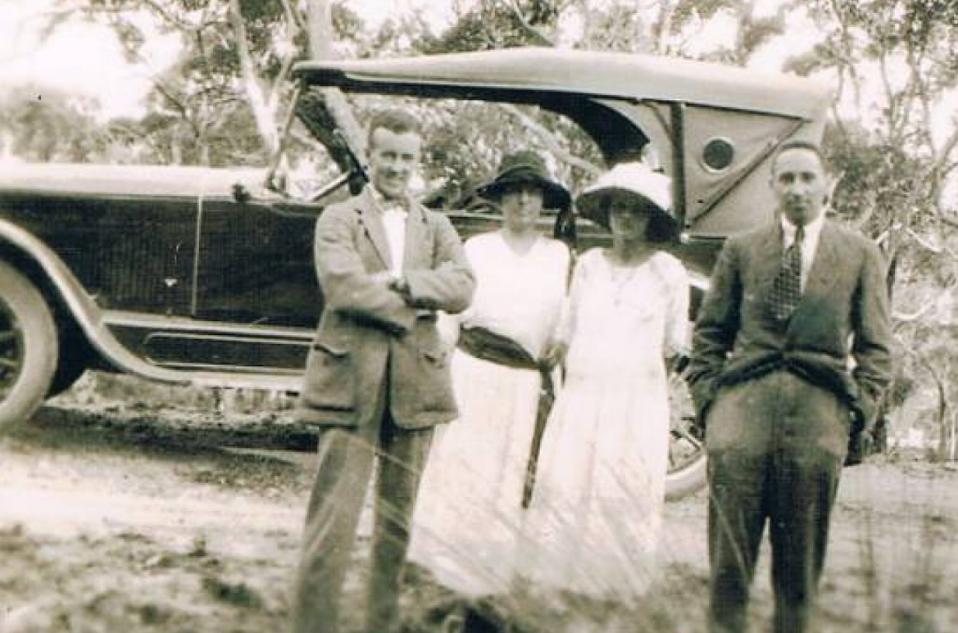
Matthew's grandfather Adrian Curlewis, Ethel Turner, Jean Curlewis and her husband Dr. Leo Charlton in the Bluer Mountains -